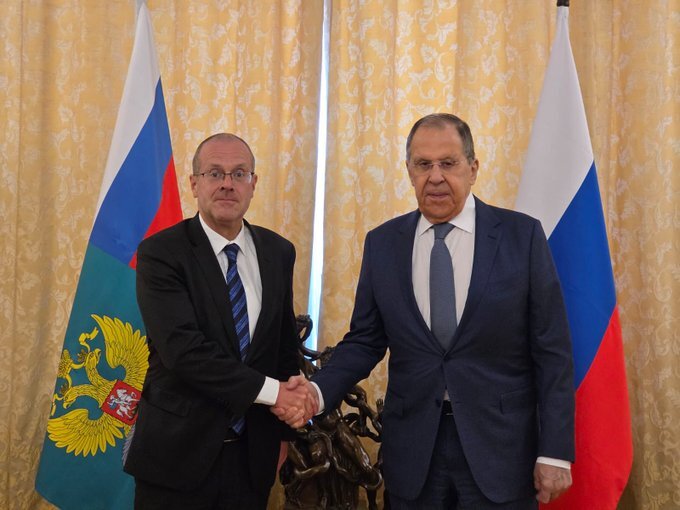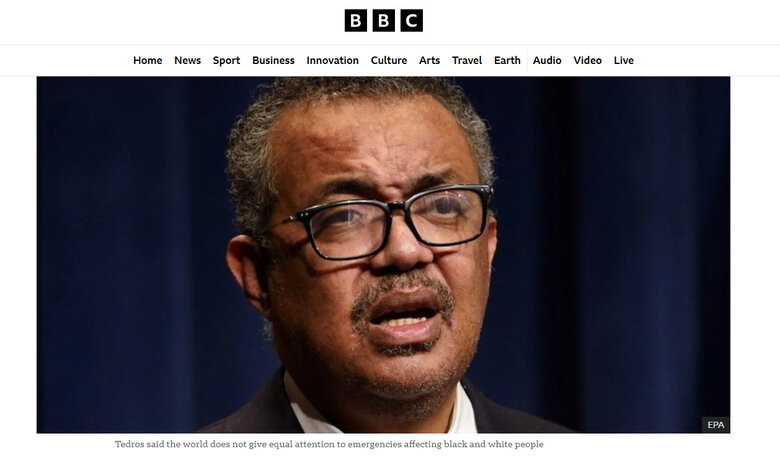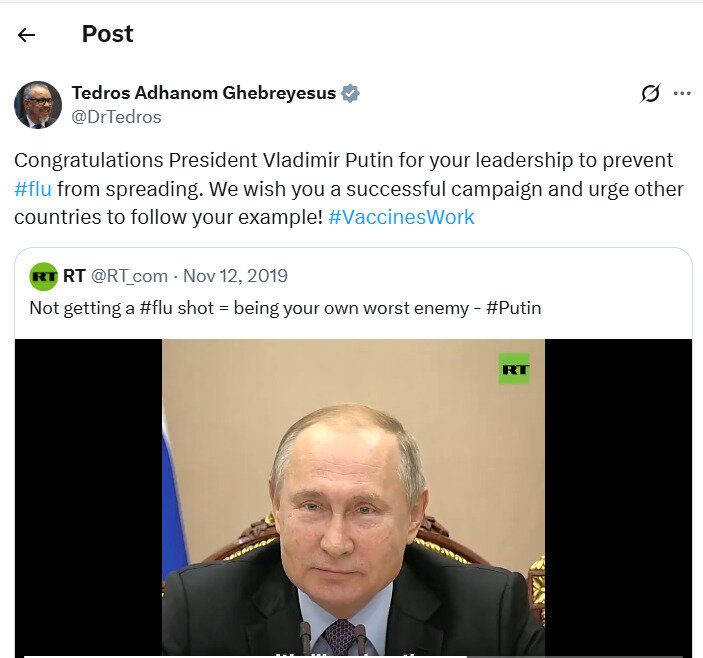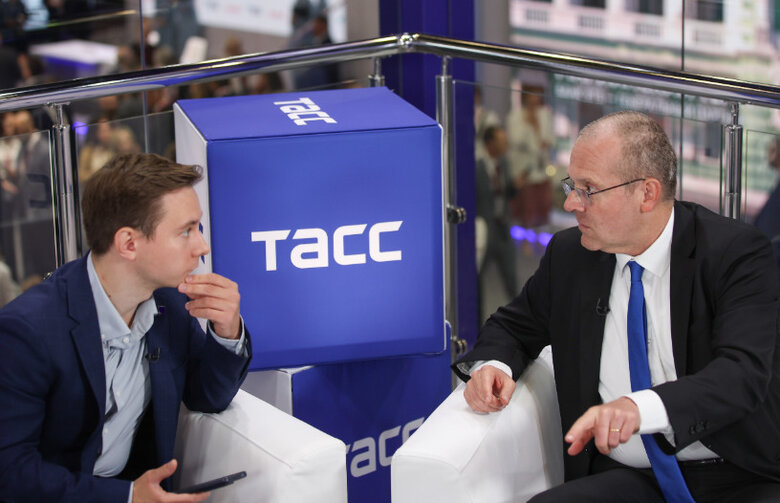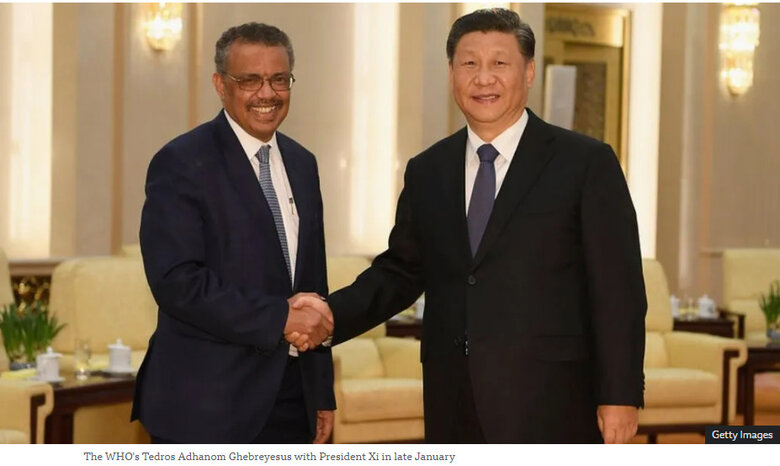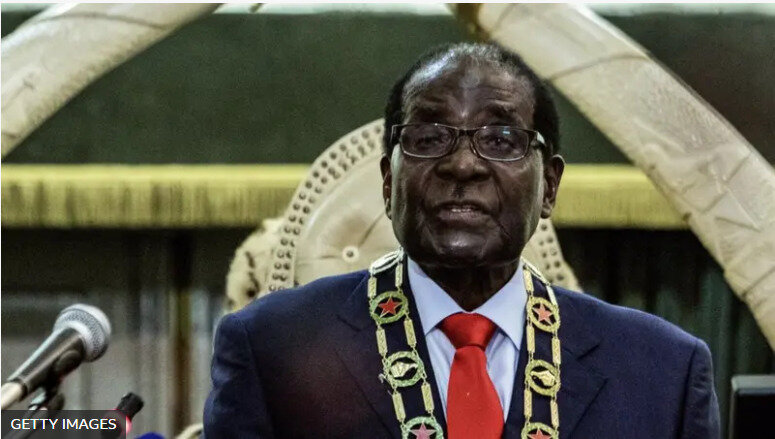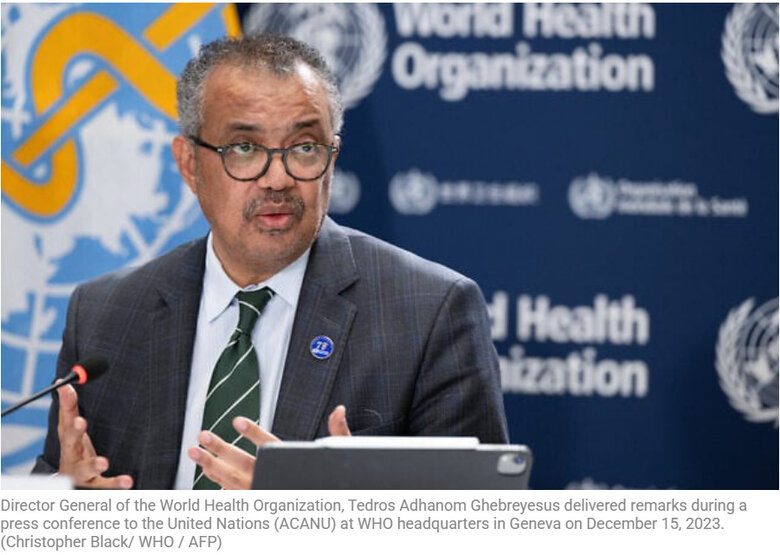WHO warns: dictators are good for your health
Taking into account the recent news, the World Health Organization has demonstrated its continued support for dictatorship by shaking hands with Lavrov. But this is not the only case. Sympathy for despots began with Zimbabwe’s Mugabe and China’s Xi Jinping. The WHO’s list of favorites also includes Palestine’s Hamas and North Korea.
А few weeks ago, the World Health Organization shocked Ukraine and Europe. In the midst of the Russian Federation's bloodthirsty war against Ukraine, when the Kremlin kills Ukrainians every night and day with missiles and "shaheds," WHO Regional Director Hans Kluge arrived in Moscow.
He smiled and posed for a photo with Russian Foreign Minister Sergey Lavrov. He held negotiations with him, which Russian propaganda presented as the WHO's recognition of the importance of partnership with Russia. Meanwhile, the Kremlin continued to attack Ukrainian hospitals and civilian targets.
"This is not just a diplomatic signal – it undermines the global position on the isolation of the aggressor country. (...) I would like to remind Mr. Kluge that throughout the full-scale war, Russia has shelled and destroyed more than 2,350 medical infrastructure facilities in Ukraine: from hospitals and maternity wards to clinics and rehabilitation centers," stated Mykhaylo Radutsky, Head of the Verkhovna Rada Committee of Ukraine on Public Health, Medical Assistance, and Medical Insurance.
The Ukrainian Ministry of Health's reaction to the WHO representative's visit to Russia was also quite harsh:
"The Ministry of Health of Ukraine believes that such visits are unacceptable at this time. Such contacts with representatives of the aggressor state weaken Russia's diplomatic isolation, sabotage the authority of international organizations, in particular the WHO, and call into question the fundamental position on the protection of international humanitarian law."
The WHO representative tried to justify his visit by saying that "the discussion focused on the urgent need to ensure comprehensive respect for international humanitarian principles, including the obligation of all parties to refrain from attacks on health facilities."
The "success" of the discussion is evidenced by the strikes carried out by Russian occupiers a few days after the visit – first on a hospital in Bila Tserkva in the Kyiv region (where a patient was killed), and then on a hospital in Dnipro.
Kluge's trip to Russia also provoked a rather nervous reaction in the European Union countries. "I am deeply disappointed by the visit of WHO representative Hans Kluge to Russia. His statement is as appalling as the visit itself. Russia is waging war against Ukraine, killing civilians and medical personnel, and attacking hospitals, including a children's cancer hospital," commented Latvian Foreign Minister Baiba Braze.
At the same time, Estonian Minister of Social Affairs Karmen Joller responded to Kluge: "I am deeply concerned about your recent high-level visit to the Russian Federation, a country that is waging a full-scale war of aggression against Ukraine, a sovereign European state. Since the invasion began in February 2022, Russia has systematically violated international humanitarian law, including attacks on medical facilities and personnel. According to the WHO, there have been more than 1,700 attacks on medical facilities since the start of the war in Ukraine."
WHO: flirting with Putin and "unjustified" attention to Ukraine
Unfortunately, there is every reason to believe that this scandalous visit by a WHO representative to the occupying country was not the independent action of a European official of the organization.
On the contrary, for at least the last eight years, the World Health Organization, under the leadership of its current Director-General, Tedros Adhanom Ghebreyesus, has repeatedly demonstrated its pro-Russian stance, openly flattering the Russian Federation and supporting the Russian dictator.
"Congratulations President Vladimir Putin for your leadership to prevent #flu from spreading. We wish you a successful campaign and urge other countries to follow your example!" (14.11.2019) - this is one of many clearly complimentary tweets from the head of the World Health Organization to the Russian dictator.
And here is how Ghebreyesus flattered Putin during a personal meeting at the end of 2017: "First of all, thank you very much for honoring us with your presence, despite your busy schedule. This demonstrates your dedication. We also thank you for your speech, which is truly a source of energy and inspiration for us. It was quite short, but very powerful."
It would seem that after the start of Russia's full-scale war against Ukraine, the "bond" between the WHO and the Kremlin would have weakened. Moreover, a year and a half after the invasion began, under pressure from European countries, the WHO finally moved its European office for the prevention and control of non-communicable diseases from Moscow to Copenhagen.
However, relations between Russia and the WHO were not severed. The organization's local office in Moscow continues to operate. Moreover, representatives of Russia and Belarus kept their seats on the WHO Executive Board until 2023. And in March 2025, the WHO representative in Moscow, Batyr Bekdiklychev, stated that Russia's membership in the organization is important for both Moscow and the WHO.
Also, in the first weeks of the full-scale war, the Director-General of the World Health Organization, Tedros Adhanom Ghebreyesus, managed to make a near-miss statement, saying that the world was paying unjustifiably more attention to the war against Ukraine than to the wars in Ethiopia, Yemen, Afghanistan, or Syria.
"I don't know if the world really pays equal attention to black and white lives. I need to be frank and honest: the world does not treat all human races equally. Some are more equal than others," the head of the World Health Organization said in April 2022.
Even during his current visit to Russia, WHO Regional Director Hans Kluge did not limit himself to meeting with Lavrov, but also attended the so-called St. Petersburg International Economic Forum, where he made several comments in favor of Russia.
In particular, he stated that the WHO Regional Office for Europe under his leadership "will never politicize health." He also clarified that he was referring to "international sanctions that may have some negative consequences in the form of the cessation of supplies of certain medicines" to Russia. This comment by Kluge was immediately spread by propagandists from Russia's TASS news agency.
"The WHO stays neutral. Our principle is "health for everyone", based on impartiality and humanity. That is why we continue to work with Russia, a country that has a shortage of medicines due to the restrictions imposed. To mitigate the effects of sanctions, we regularly supply medicines to Russians," Kluge noted another media.
Such pro-Russian statements by Kluge are all the more painful for Ukrainians because, as Irina Nemirovich, co-founder of the Tabletochki Charitable Foundation and former Head of the Strategic Planning Directorate of the Ministry of Health, recalls, Ukraine actively supported Kluge's candidacy for the position of head of the WHO European Office: "He swore his love for Ukraine and eternal support. And what do we have today?"
In addition, Kluge visited Ukraine at the beginning of the full-scale war and had the opportunity to see with his own eyes the Ukrainian hospitals bombed by the Russians.
"I saw it with my own eyes when I visited Ukraine shortly after the war began. In some regions, not a single pharmacy or primary care clinic survived. I spoke to an elderly woman who no longer had access to the essential medicines she needed to treat her illness, and she did not have enough money to evacuate to a safer part of Ukraine. So she stayed put and waited to die, either from the war or from her illness, whichever came first," recalled Hans Kluge, head of the WHO Regional Office for Europe.
So now, after witnessing everything, the WHO representative speaks of the inadmissibility of "politicizing health" and impartiality.
When you really don't want to lose $22 million
Mykhaylo Radutsky, Head of the Verkhovna Rada Committee of Ukraine, criticizing the WHO representative's visit to Russia, quite transparently hinted that the reasons for this visit were probably financial.
"This sounds particularly alarming considering the WHO's financial difficulties due to the refusal of some countries to finance the organization. Such a meeting may indicate a willingness to compromise even with those who disregard humanitarian law in order to preserve donor funds," mentioned M. Radutsky.
Indeed, the WHO is currently experiencing difficult times in terms of financing. Over the next two years, the organization's program budget will decrease by almost a quarter – from $5.3 billion in 2024-2025 to $4.2 billion in 2026-2027.
At the same time, however, fixed contributions from member states will increase by 20% over the next two years.
This difference in dynamics is explained by the fact that the WHO budget consists of two parts: fixed contributions from member states and voluntary contributions from countries, foundations, and international institutions (in 2024-2025 the WHO was funded by the Bill and Melinda Gates Foundation, GAVI Alliance, the European Commission, the World Bank, etc.).
It should be noted that US President Donald Trump signed a decree on the withdrawal of the US from the WHO on the very first day of his second term. Argentina, Italy, and Hungary may follow the US. Also, given its own problems with the WHO (more on this below), Israel considered withdrawing from the organization as well.
In this situation, the importance of contributions from poorer but relatively large economies, such as Putin's Russia, is growing.
Since the WHO operates under the United Nations, the share of contributions is determined by existing UN standards. A single country's contribution cannot be less than 0.001% of the organization's total budget, but it also cannot exceed 22%.
At first glance, Russia's share of the WHO budget is not that large – only 1.87%. Or $22.2 million for 2024-2025.
However, the withdrawal of the United States, which had planned to provide the WHO with nearly $1 billion over the next two years ($958.5 million in fixed and voluntary contributions), creates a huge deficit in the organization's budget. Therefore, even Russia's contribution gains more importance.
Affinity for dictators – from Mugabe to Xi Jinping
The WHO's "bond" with Putin and other dictators over the past decade has become the "trademark" of the World Health Organization.
Let us recall that in the autumn of 2017, during the first months of the current WHO Director-General Tedros Adhanom Ghebreyesus's office, the World Health Organization unexpectedly found itself tangled in a high-profile scandal on the subject.
At that time, the WHO decided to make Robert Mugabe, the infamous dictator and then "president" of Zimbabwe, its "goodwill ambassador" for non-contagious diseases.
The World Health Organization was unable to explain why Mugabe, who was 93 at the time (almost twice the average life expectancy in Zimbabwe), deserved such an honor. The population of Zimbabwe suffered from numerous diseases, in particular, setting new world records for the number of AIDS patients per capita. Doctors suffered without salaries, and hospitals without medicines.
This scandal was so avalanching (in particular, the United Kingdom and leading international human rights organizations categorically opposed the appointment) that Mugabe only managed to serve as WHO "ambassador" for a couple of days.
However, the World Health Organization's strange attraction to dictatorships and anti-democratic movements went on.
Thus, at the beginning of the coronavirus pandemic, the US directly accused the WHO leadership of excessive toying with China. And indeed, if the WHO had been able to isolate certain areas of China in time at the beginning of the pandemic, the world would probably have weathered it much more easily.
Also, to please China, the head of the WHO fell out with Taiwan, effectively blocking its entry into the organization.
Well in general, the new WHO head's "affection" for China does not seem surprising, since, according to the research by Foreign Policy and several other leading Western media outlets, it was China that lobbied most for the election of the current WHO Director-General Ghebreyesus.
Western countries (in particular, the US and the UK) backed British doctor David Nabarro, who had significantly more experience in resolving international medical crises (including Ebola in Africa and cholera in Haiti) than Ghebreyesus.
Last year, Israel openly accused the WHO of colluding with Hamas. The organization, we recall, called on Tel Aviv to refrain from a ground operation in the Gaza Strip and not to capture the hospital where the terrorists were located.
The World Health Organization also made very complimentary statements about Iran, and recently, a representative of…North Korea joined the WHO Executive Board, which was strongly criticized by South Korea.
Some experts interpret this "dictatorphilia" by the biography of the current WHO Director-General Tedros Adhanom Ghebreyesus.
He is from Ethiopia, which is not a very democratic country.
Moreover, as reported by The Times, at the end of 2020, American economist and former US National Security Council advisor David Steinman accused Ghebreyesus of involvement in the genocide in Ethiopia in 2013-2016.
According to Steinman, the future head of the WHO exercised control "over the killing, inflicting serious bodily injury, and mental harm to members of the Amhara, Konso, Oromo, and Somali peoples with the intent to destroy these peoples as a whole or partially." And the ruling regime in Ethiopia, when Ghebreyesus headed the country's Foreign Ministry, according to Steinman, was characterized by "large-scale and systematic crimes against humanity committed by his subordinates."
Ukraine and the WHO: insignificant costs, same benefits
Given the current WHO's proximity to Putin's Russia and other dictatorships, the question is: does Ukraine need membership in such a World Health Organization?
Should we follow the example of the US and part ways with the WHO?
Of course, unlike the US, Ukraine does not spend significant funds on the WHO. Ukraine's membership in the organization costs only $665,500. This is our contribution for two years –2024 and 2025. However, for the next two-year period, the contribution is expected to increase by 20%.
Yes, on a national scale, this is a negligible amount. Although in the context of a full-scale war, it would seem more reasonable to spend $665,500 on drones and ammunition for the Armed Forces of Ukraine.
Moreover, the real benefits of Ukraine's membership in the WHO do not seem to be very significant.
Last year, the WHO Strategy for Cooperation with Ukraine till 2030 was approved.
And although this document describes political priorities much better (in particular, the military aggression of the Russian Federation against Ukraine), unlike the statements of the WHO Director-General, for the most part, both the goals and the role of the WHO in Ukraine's post-war recovery, particularly in the field of healthcare, appear to be both excessively declarative and overly modest.
The WHO is largely limited to the role of coordinator, provider of expert support, and mediator of international cooperation.
Presumably, Ukraine, as a country that is forced to endure the largest war in Europe since World War II and in which a significant part of the medical infrastructure (2,350 hospitals and clinics, according to M. Radutsky) has been destroyed, could hope for more proactive and serious support from the WHO.
In turn, the co-founder of the Ukrainian Health Center (UHC), Pavlo Kovtoniuk, mentioned in his blog that such cooperation should either be completely terminated or at least suspended. "I do not understand how it is possible to continue full cooperation with WHO. If not to terminate it entirely, then at least lower the level. Suspend joint projects, do not start new ones. Do not hold joint events, boycott activities. Besides, I cannot imagine how Hans Kluge can be received in Ukraine," writes Pavlo Kovtoniuk.
In general, Ukrainian officials and MPs should be more cautious in their contacts with the WHO after the calls of the World Health Organization representatives to "not politicize health," their stories about the harm of sanctions to the public health of Russians, and their active friendship with dictators around the world, including Putin. We must ask ourselves: Is the World Health Organization a friend or enemy to Ukraine?
Olha Skorokhod, Censor. NET

